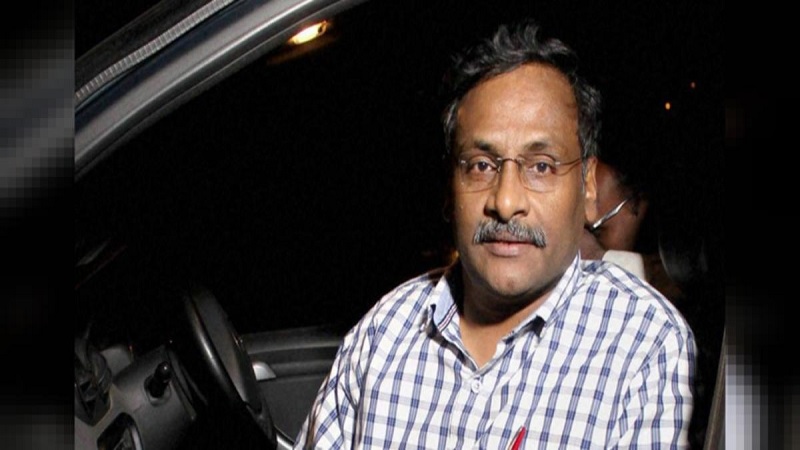
Image Courtesy:thewire.in
In yet another example of how low the State can stoop, when it comes to respecting the human rights of prisoners, particularly ailing and aged political dissenters, Nagpur Jail authorities have been denying Prof GN Saibaba a plastic water bottle for three weeks! The former Delhi University professor, who is ninety per cent physically disabled and wheelchair-bound, is unable to lift the small pot kept in his cell or even a glass bottle, and has reportedly been unable to hydrate himself adequately amidst soaring temperatures due to this.
Advocate Aakash Sarode told The Hindu, “I had taken permission from the jail authorities to get him a plastic bottle and only then I had got the bottle. No reason was given to me for refusing the bottle. Sai cannot carry a glass bottle because it is heavy and he has severe pain in shoulders and metal bottles are not allowed inside prison.”
But jail authorities reportedly refused the bottle claiming it was a jar. The Hindu quoted an anonymous source from the Superintendent Anupkumar Kumre’s offices as saying, “We had given permission for a plain, transparent plastic bottle for Saibaba only on humanitarian grounds because he is handicapped. But what his lawyer got was a jar. Jars are not accepted in jail. If they send a simple plastic water bottle, we will take it.”
Brief background of the case
The Sessions Court at Gadchiroli on May 7, 2017 has sentenced Prof. Saibaba to life imprisonment under the Unlawful Prevention (Activities) Act (UAPA), for alleged links with banned organisation Communist Party of India (Maoist). He had appealed against the Judgment of the Sessions Court before the Nagpur Bench of Bombay High Court, but his appeal has been pending for the last five years.
Dr. Saibaba, who has been a long-time defender of the rights of India’s minorities, especially Dalits, Adivasis and forest dwelling communities, against vested corporate interests, was first arrested in in May 2014, and eventually sentenced to life imprisonment in March 2017, for “waging war against the state”. As an activist and rights defender, Dr. Saibaba has campaigned against a push to end reservations for lower castes, as well as against “encounter killings” of innocent people in Andhra Pradesh. He launched the Forum Against War on People, in response to the Indian government’s Operation Green Hunt in India’s tribal belt, which allegedly cracked down on Adivasis in the region. He organised a national campaign against the operation that reportedly led to investors pulling out. In July 2015, he told The Hindu that the authorities felt “the best way to stop me was to throw me in jail.”
Health problems
Prof. Saibaba is reportedly suffering from pancreatitis, high blood pressure, cardiomyopathy, chronic back pain, immobility and sleeplessness. It is also reported that Prof. Saibaba’s left hand is on the verge of failure and there is acute pain spreading in both his hands.
Hottest summer gets hotter inside the cell
As the temperatures in Nagpur have risen up to 45 degrees Celsius, and in the ‘anda cell’ it gets very hot, Saibaba had been requesting the Nagpur Central Jail authorities to allow plastic bottles for the last three weeks.
As reported by The Hindu, Saibaba’s wife, Vasantha Kumari, said, “There is a small pot kept in the cell and Sai keeps requesting his helper, who is also a convict, to give him water. But at night when he feels thirsty, he can’t wake his inmate and bother him for water. He has started getting unconscious because of the heat and lack of hydration inside the anda cell.”
According to the protocol, when any item is received for the prisoner, it has to get approved by a two-star jailor. After his approval, the item needs to be seen by the senior jailor and then it gets approved. However, as per Mr. Saroda, “Without seeing the bottle, the jailor refused to accept it,” as quoted by The Hindu.
United Nations Convention on the Rights of Persons with Disabilities
It would be useful for the authorities who are responsible for Prof. Saibaba’s health in custody to be informed of India’s commitment to the UN Convention on the Rights of Persons with Disabilities (UNCRPD). These are:
Article 4(d): – “To refrain from engaging in any act or practice that is inconsistent with the present Convention and to ensure that public authorities and institutions act in conformity with the present Convention.”
Article 15(1): – “No one shall be subjected to torture or to cruel, inhuman or degrading treatment or punishment. In particular, no one shall be subjected without his or her free consent to medical or scientific experimentation.”
Article 15(2) places an obligation on the State to protect persons with disabilities from cruel degrading treatment and punishment.
Article 15(2): – “States Parties shall take all effective legislative, administrative, judicial or other measures to prevent persons with disabilities, on an equal basis with others, from being subjected to torture or cruel, inhuman or degrading treatment or punishment.”
The norm of substantive equality, well established through constitutional jurisprudence in India, speaks of the principle of equality that necessarily includes special treatment for persons who are vulnerable. The denial of special provisions, appropriate assistance and specialised health care access to a person with disabilities in custody, who uses a wheelchair and has special health care needs arising from chronic illness, comes firmly within the meaning of degrading, inhuman and cruel treatment in derogation of the state’s obligation under the UNCRPD.
Related:
UN rights experts call for G. N. Saibaba’s release
As Prof Saibaba’s health deteriorates, Vasantha wants him to be transferred to a facility in Hyderabad
Torpedoing Justice: How the State uses Malicious Prosecution against Human Rights Defenders